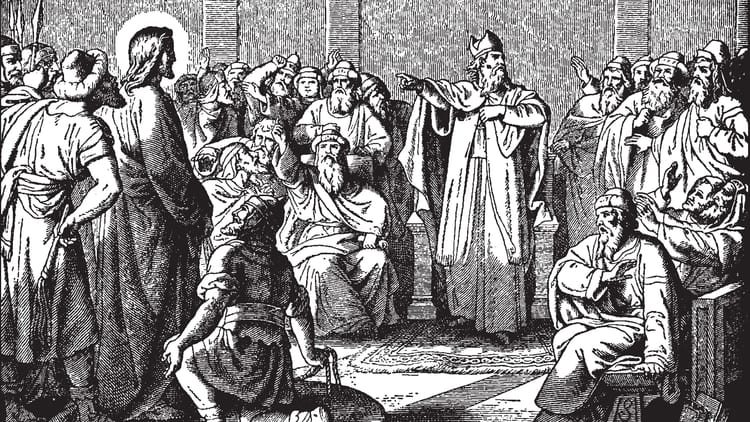Two Ways to Respond to Jesus (Mark 14:1-11)

Big Idea: Respond to Jesus with love and devotion, not with opposition.
It’s always a little awkward to join a conversation midway. You have to get a sense of what’s been said before or else you may completely miss what’s going on.
And that’s just what we find as we come to Mark 14. We’re in the back third of the earliest and the shortest of the four gospels that tell the story of the life of Jesus. And what an account it is. If you read the Gospel of Mark, you will find that it’s vivid. It’s gripping. It’s action-packed.
Who is Jesus?
The first part of Mark focuses on one question: Who is Jesus? And that is such an important question to answer even today. In fact, it is perhaps the most important question you will ever have to answer. How you answer changes everything. And Mark helps us answer this question accurately by both telling and showing us who Jesus is.
- He tells us. The very first verse of the book of Mark tells us: he is “of Jesus Christ, the Son of God.” In other words, he is the promised Messiah, and he is God’s Son, come to fulfill all God’s promises. Mark tells us who Jesus is.
- And then he shows us. Mark gives us story after action-packed story. Jesus heals, casts out demons, and teaches. He creates a community of followers and commissions them. He divides. People have different reactions to who he is. But eventually the picture becomes clear. He is God’s Suffering Servant promised in the Old Testament. And he has come to serve by suffering. He says in Mark 10:45, “For even the Son of Man came not to be served but to serve, and to give his life as a ransom for many.”
If you need a refresher on who Jesus us — and who doesn’t — then I encourage you to read the early chapters of Mark. Nothing is more needed or urgent than seeing Jesus clearly and understanding who he is. How you answer this question changes everything. You will find that Jesus is the most surprising and compelling person in history.
Okay, that’s who Jesus is. Jesus is the promised Messiah, and he is God’s Son, come to fulfill all God’s promises. And he is amazing. But here’s the other question Mark wants to help answer: How will Jesus become king? We’re going to get to that in coming weeks.
But today Mark has a question for us: how will we respond to who Jesus is?
How Will We Respond?
The story we just read asks us one big question: how will we respond to who Jesus is? And then it gives us two options.
Option 1: Love and Devotion
Verses 3 to 9 give us one option of how to respond to Jesus.
The scene: they’re at the house in Bethany. It’s the village where Jesus probably returned each evening while visiting Jerusalem for Passover. It was just a couple of miles away. Jesus had just taught, and now came back to rest for the evening.
Jesus went to a dinner party at Simon the leper's house. Simon was someone who may have been cured of leprosy by Jesus. It’s quite possible that this may have been an appreciation dinner for what Jesus had done in his life. Imagine what it would have been like to be there. The Gospel of John tells us that Jesus’ two good friends Mary and Martha were there (John 12:2). Lazarus, the man that Jesus had raised from the dead, was also there. It was a night among friends, a night among people who had been transformed by who Jesus is.
And then something remarkable happened.
Read verse 3. “And while he was at Bethany in the house of Simon the leper, as he was reclining at table, a woman came with an alabaster flask of ointment of pure nard, very costly, and she broke the flask and poured it over his head.”
A woman, whose name is not mentioned by Mark, had a flask made of alabaster. This type of flask is usually used for the best perfumes and ointments. The flask contained pure nard, a highly valued plant from India. The narrow neck of the flask would have restricted the flow of the nard. To bypass this, the woman broke the flask open and poured all of it on Jesus’ head. Verse 5 tells us that it would have been worth more than three hundred denarii, or about a year’s wages for a laborer. She held nothing back.
You need to understand that Jerusalem would have been a pretty smelly place at this time. The air would have been filled with the smell of burning flesh from the sacrifices. It’s likely that the air in Bethany would have been pungent with the smell. But all of that changed as the smell of an entire bottle of nard filled the room.
What was she doing here? Anointing was common at feasts, but not like this. This anointing was way too extravagant. Anointing was something that was normally done for kings or priests. But that doesn’t seem to be what’s happening here either. That leaves one other purpose for this anointing. People were anointed for burial. They didn't embalm the bodies. Instead, they used perfume and spices to anoint them as a sign of love and to mask the odor of decay.
And that’s exactly what Jesus identifies as the purpose of this anointing. Verse 8 says, “She has done what she could; she has anointed my body beforehand for burial.”
This woman anointed Jesus in an act of love and adoration. Jesus knew that his death was coming, and he interpreted her actions in light of his upcoming burial.
How do you respond to Jesus? If you really understand who he is, you respond in worship by giving everything that you’ve got, holding nothing back.
Not everyone at this dinner party appreciated her actions. They thought it was wasteful, that she could have given the money away for the poor. Listen to what Jesus said:
Leave her alone. Why do you trouble her? She has done a beautiful thing to me. For you always have the poor with you, and whenever you want, you can do good for them. But you will not always have me. She has done what she could; she has anointed my body beforehand for burial. And truly, I say to you, wherever the gospel is proclaimed in the whole world, what she has done will be told in memory of her. (Luke 14:6-9)
Caring for the poor is important. It’s part of our ordinary duty as believers. Jesus was not in any way putting down the importance of caring for the poor. It’s essential.
Something unusual was happening at that time and required an exceptional response, and this woman did just that. She recognized who was before her, and she poured out everything in devotion to him.
How do you respond to Jesus? Here’s one way. See him for who he is. Become overwhelmed in your heart with gratitude to him. Worship him. Give everything you have to him. Don’t hold back.
Notice, by the way, who sets the example of how to respond in this passage: a woman. In that culture, women would have been in a different part of the home during social gatherings. This woman broke through that. She wasn’t a religious leader like the others that we’re about to encounter. And she got it!
One commentator (Donald England) writes:
Contrary to much that has been written about certain biblical verses being oppressive of women, there is in the gospels a strong vein of teaching about the vital role of women, and about the superior contribution they make in their own way at absolutely crucial points in the story. This becomes clearer, significantly, as the gospels move to their highest point in death and resurrection.
Friends, love Jesus recklessly. Respond in love to what he’s done for you. When you really see who Jesus is, it’s the only way to respond.
Option 2: Opposition
Sadly, though, not everyone responds this way. Mark sandwiches the story of the woman who responded in love and worship with others: the chief priests and scribes who wanted to kill him in verses 1 and 2; and Judas, one of Jesus’ disciples, who plotted to kill Jesus in verses 10 and 11.
Talk about a difference. On one hand, you have reverential love and worship. On the other hand, you have evil plotting by people who know better.
While she acts out of sacrificial love for him, the religious leaders act out of self-interest, seeking to destroy the one they view as a threat to their authority. She acts with humility; they demonstrate pride. She has the mind-set of the kingdom; they are building their own personal empires. As elsewhere in Mark, an “outsider”—in this case, a woman of no social standing—comprehends Jesus’ status and so receives commendation, while Israel’s religious “insiders” plot to destroy the Lord’s Anointed, and so will suffer loss. (Mark Strauss)
Mark is a very skilled author here. What he’s telling us is that there really isn’t any middle ground. Mark has been building his case for chapter after chapter about who Jesus is. And now he’s pressing the point: how will you respond?
And that’s the question I want to leave with you today.
We’re approaching Easter. We get to spend a few weeks thinking about who Jesus is and how exactly he became king. My goal is that we will be overwhelmed by the love and grace and majesty and wonder of Jesus.
And then my goal is that we will respond with all our hearts in worship. Don’t make the same mistake as those who missed out on Jesus. Worship him. Trust him. Make him your greatest treasure. Live for him.
We face only two options. How will you respond?
Lord, thank you for Jesus. I am so excited to look at Mark’s gospel as we prepare for Easter and to take another glimpse of the beauty and grace and love of Jesus.
Help us to respond. Help us never to be halfhearted. Allow us to respond with all of our hearts in worship and gratitude to him. In Jesus’ name, Amen.





